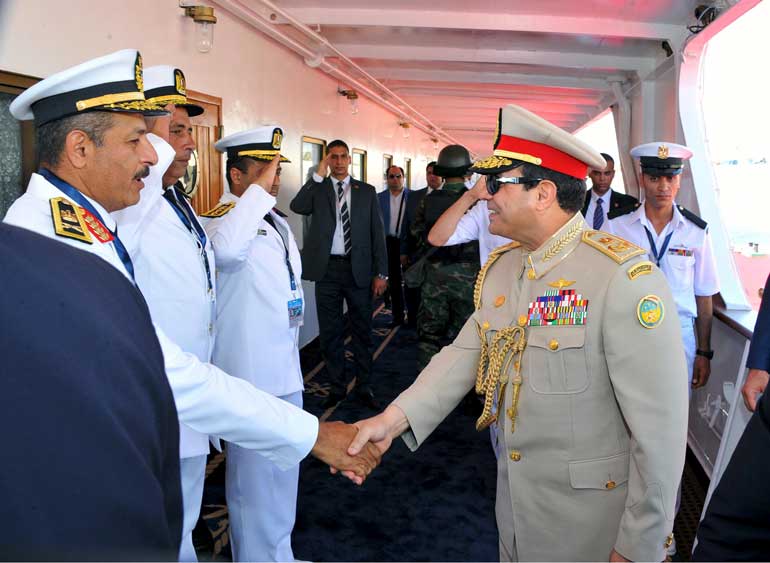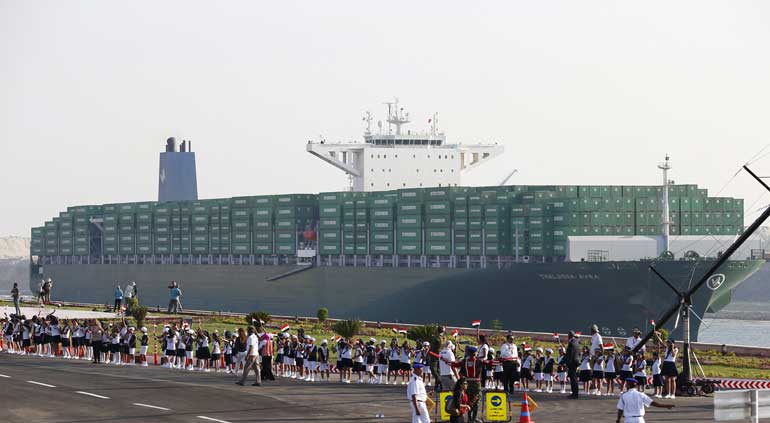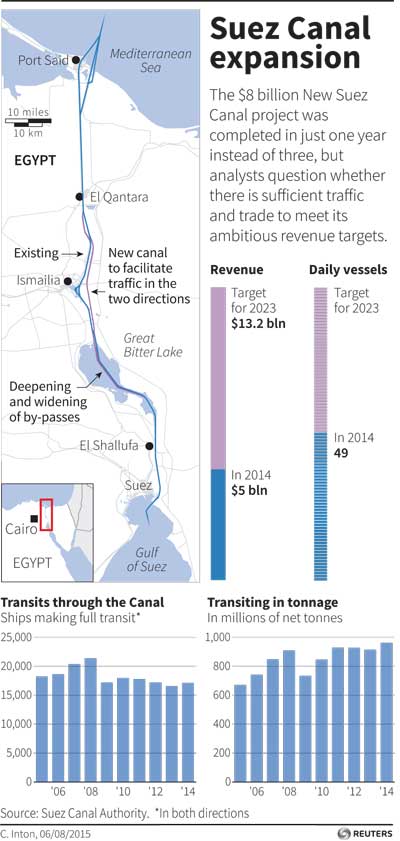Sunday Feb 22, 2026
Sunday Feb 22, 2026
Monday, 10 August 2015 00:00 - - {{hitsCtrl.values.hits}}

Egyptian President Abdel Fattah al-Sisi (R) shakes hands with crew members onboard a historic yacht on the Suez Canal as he attends the celebration of an extension of the Suez Canal in Ismailia, Egypt

A cargo container ship crosses the new section of the Suez Canal after the opening
ceremony of the new Suez Canal, in Ismailia, Egypt last week
Ismailia, Egypt (Reuters): Egypt received a show of international support last week as it inaugurated a major extension of the Suez  Canal which President Abdel Fattah al-Sisi hopes will power an economic turnaround in the Arab world’s most populous country.
Canal which President Abdel Fattah al-Sisi hopes will power an economic turnaround in the Arab world’s most populous country.
The former armed forces chief, who led a military takeover two years ago but ran for president as a civilian last year, told a ceremony attended by French, Russian, Arab and African leaders that Egypt would defeat the terrorism that dogged the project.
“Work did not take place in normal circumstances, and these circumstances still exist and we are fighting them and we will defeat them,” Sisi said after signing an order allowing ships to cross the New Suez Canal.
“We promised a gift to the world and we accomplished it in record time - an additional artery for prosperity and for connecting civilization to enhance the movement of international trade,” he said, as the first vessel, a container ship called CMA CGM TITAN, blew its horn and passed through the canal.
The $ 8 billion project was completed in just one year instead of three on Sisi’s orders, but economists and shipping analysts question whether there is sufficient traffic and east-west trade to meet its ambitious revenue targets.
The canal expansion is the centrepiece of a grand agenda by Sisi to cement his tenure as the man who brought stability and prosperity to Egypt after he ousted elected Muslim Brotherhood President Mohamed Mursi in 2013 following mass protests.
Sisi, in full military regalia, sailed up the canal, flanked by a young boy in military fatigues waving the Egyptian flag, aboard the yacht El-Mahrousa, the first ship to pass through the Suez Canal when it was opened in November 1869.
Cairo and other cities were decked out in bunting, with fairy lights hung from the Nile river bridges and banners proclaiming “From the mother of the world (Egypt) to the whole world”.
Egypt had been reeling from years of turmoil since the Arab Spring uprising that deposed autocrat Hosni Mubarak in 2011, and many of the country’s nearly 90 million population have suffered from a slower economy, a fall in tourism and high inflation.
The government believes the New Suez Canal and an industrial zone to be developed around it will seal Egypt’s deliverance from economic purgatory - to the skepticism of some.
The project involved extending a waterway parallel to part of the 19th century canal connecting the Mediterranean to the Red Sea, as well as deepening and widening the old channel - the shortest shipping route between Europe and Asia.
The Suez Canal Authority expects a windfall of additional revenue - $ 13.23 billion in annual revenue by 2023 from just over $ 5 billion in 2014, with the number of daily vessels rising from 49 to 97 over the same period.
But sluggish world trade, competition from an expanded Panama Canal and a slower Chinese economy make it unlikely the project can achieve its revenue targets anytime soon or bring about a significant fall in unemployment from about 13%.
Some economists have branded the projections ‘wishful thinking’ especially since Suez Canal revenue growth has failed to keep pace with growth in world trade since 2011.